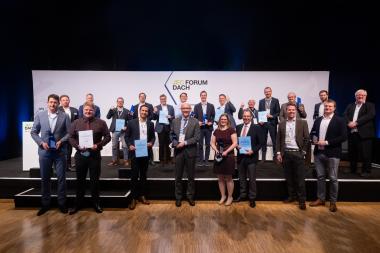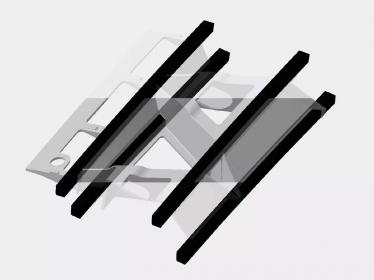The AVK – Industrievereinigung Verstärkte Kunststoffe – presents its Innovation Awards 2021
The AVK – Industrievereinigung Verstärkte Kunststoffe – has once again presented its Innovation Awards to companies, institutes and their partners. Three composites innovations were recognised in each of the three categories – “Innovative Products/Applications”, “Innovative Processes” and “Research and Science” – at the new event JEC Forum DACH on 23 November 2021, the first edition of which was held in Frankfurt.
“As usual, the submissions included a lot of very interesting and promising products and processes this year. The Innovation Awards highlight the outstanding efficiency, cost-effectiveness and sustainability of fibre-reinforced plastics as well as the companies and institutes operating in the sector,” explains Dr. Elmar Witten, Managing Director of the AVK. The jury of leading experts from the industry honoured the following innovations this year:
Category “Research and Science”
First place in the “Research and Science” category was awarded to the German Aerospace Center (DLR) for its Bondline Control Technology (BCT). This innovative process is used for quality control and assurance of bonded joints. The core element is a porous fabric which is applied to a joining surface using an epoxy adhesive or matrix resin. Peeling away the fabric creates a chemically reactive and undercut surface and can also be used as a test to check adhesion to the substrate. BCT has potential in a variety of possible applications. For example, peel ply can be replaced by BCT fabric to produce composite components with an optimised joining surface. The cost-effective BCT peel test is suitable for coupon testing and process control. In addition, the combined adhesion test and surface pre-treatment can be used for quality assurance of bonded repairs on fibre composite structures.
Second place was taken by the Institute of Textile Technology (ITA) at RWTH Aachen University and its partners AEROVIDE GmbH, Altropol Kunststoff GmbH, Basamentwerke Böcke GmbH, TechnoCarbon Technologies GbR with “StoneBlade – Lightweight construction with granite for the wind industry”. This innovation enables manufacturers to reduce the amount of non-recyclable materials used in rotor blade construction. At the same time, it reduces the weight of these components and improves the mechanical properties relating to the stability of wind turbines. The innovative approach replaces glass-fibre reinforced plastic in the blade components with hard rock – a natural, cost-effective and recyclable lightweight material. The slabs of rock are cut and ground to a thickness of just a few millimetres and embedded in a fibre composite laminate with carbon fibre, which stabilises them for alternating load cases. The pre-stressed material is pressure-stable in the composite and can absorb tensile forces in the event of continuously alternating loads without any loss of stiffness.
Third place went to the Dresden University of Technology – Institute for Lightweight Construction and Plastics Technology (ILK) with its partner Mercedes Benz AG for the interdisciplinary development of a highly integrated inductive charging module for electric vehicles. The ultra-thin charging module was designed to make optimum use of space in the vehicle underbody without reducing ground clearance. An interdisciplinary approach was adopted for the development process. This involved the electrical, mechanical and process characterisation of high-frequency Litz wires, ferromagnetic foil and metal wire cloth as well as the creation of a simulation model. The result is a demonstrator for a charging system with a structural height of 15 mm and a total weight of 8 kg. It achieves a transmission efficiency of up to 92 percent at 7.2 kW nominal power and active air cooling. The hardware demonstrator was fabricated in a 3-step process using RTM and VARI techniques.
Overview of all the winners in the three categories:
Category “Innovative Products/Applications”
1st Place: “Traffic signs from Nabasco (N-BMC)” – Nabasco Products BV and Lorenz Kunststofftechnik GmbH, partners: Pol Heteren BV and NPSP BV
2nd Place: “Novel, ultratough vinyl ester resin for the construction of large marine vessels” Evonik Operations GmbH
3rd Place: “Air intake housing with a multi-material design for gas turbines” – MAN Energy Solutions SE, Leichtbau-Zentrum Sachsen GmbH and Leichtbau-Systemtechnologien KORROPOL GmbH.
Category “Innovative Processes”
1st Place: “In-mould wrapping” off-tool, film-coated, fibre composite components for exterior applications – BMW Group, Partner: Renolit SE
2nd Place: “Adaptive automated repair of composite structural components in the aviation sector” – Lufthansa Technik AG, Partner: iSAM AG
3rd Place: “Automated surface pre-treatment using VUV excimer lamps” – CTC GmbH
Category “Research and Science”
1st Place: “Bondline Control Technology (BCT)” – German Aerospace Center (DLR)
2nd Place: “StoneBlade – Lightweight construction with granite for the wind industry” – Institute of Textile Technology at RWTH Aachen University, Partners: AEROVIDE GmbH, Altropol Kunststoff GmbH, Basamentwerke Böcke GmbH, TechnoCarbon Technologies GbR
3rd Place: “Interdisciplinary development of a highly integrated inductive charging module for electric vehicles” – Dresden University of Technology – Institute for Lightweight Construction and Plastics Technology (ILK), Partner: Mercedes Benz AG
Submissions for the next Innovation Award can be made from the end of January 2022.
AVK - Industrievereinigung Verstärkte Kunststoffe e. V.






